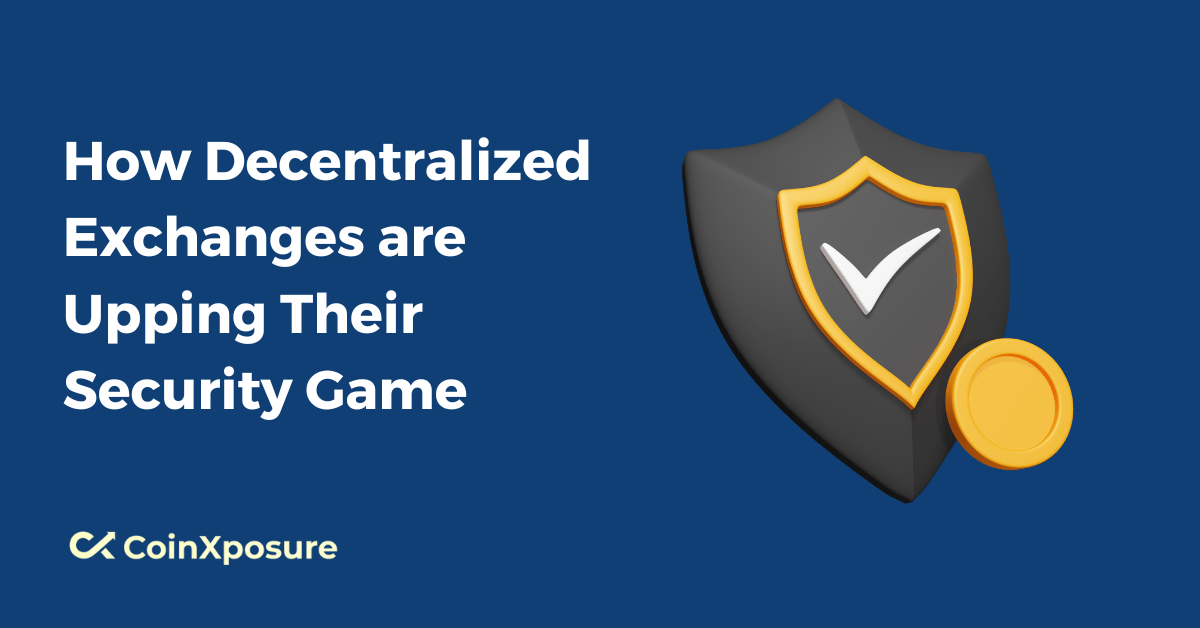
How Decentralized Exchanges are Upping Their Security Game
As decentralized exchanges (DEX) continue to revolutionize the cryptocurrency landscape, the imperative to bolster security measures has become paramount.
This introduction explores the proactive steps taken by DEX platforms to enhance their security, safeguard user assets, and fortify against emerging threats.
From smart contract audits to innovative cross-chain solutions, this overview delves into the multifaceted strategies employed by decentralized exchanges, showcasing their commitment to creating resilient and trustworthy trading environments in the decentralized finance (DeFi) realm.
Key Security Measures. Explain before listing
Before delving into specific security measures, decentralized exchanges (DEX) prioritize a multifaceted approach to fortify their platforms.
These measures are designed to safeguard user assets, mitigate potential vulnerabilities, and ensure the overall integrity of the decentralized trading environment.
Key security measures encompass thorough smart contract audits, implementing multi-signature wallets, and integrating decentralized identity solutions.
By adopting these proactive strategies, DEX platforms aim to create a resilient foundation that inspires confidence among users and withstands the evolving landscape of cybersecurity challenges.
Cross-Chain Compatibility of Decentralized Exchanges
Cross-chain compatibility is a pivotal element in the ongoing evolution of decentralized exchanges (DEX), addressing the need for interoperability in the diverse blockchain ecosystem.
This involves enabling seamless transactions and asset transfers between different blockchain networks.
The significance of cross-chain compatibility lies in its capacity to broaden the scope of decentralized finance (DeFi) by supporting multiple blockchains, each with its unique features and functionalities.
DEX platforms embracing cross-chain compatibility aim to unlock greater liquidity and asset diversity.
The advantages include improved user flexibility, reduced dependency on a single blockchain’s limitations, and the facilitation of decentralized trading across various digital assets.
However, achieving cross-chain compatibility is not without challenges. Interoperability concerns, such as varying consensus mechanisms and transaction formats, necessitate developing sophisticated solutions.
Cross-chain protocols and atomic swaps emerge as key tools, enabling secure and trustless exchange of assets between disparate blockchains.
By navigating the complexities of cross-chain interactions, DEX platforms enhance their utility, providing users with more extensive opportunities for decentralized trading while maintaining the security and integrity of the overall ecosystem.
This commitment to interoperability contributes to the ongoing maturation of decentralized exchanges in the rapidly evolving blockchain landscape.
User Education and Awareness of Decentralized Exchanges
User education and awareness play a crucial role in the enhanced security posture of decentralized exchanges (DEX).
DEX platforms recognize the significance of empowering users with the knowledge and tools necessary to protect their assets in a decentralized environment. Here’s how user education and awareness contribute to a more secure DEX ecosystem:
- Clear Guidelines on Security Practices
- Regular Updates on Risks and Countermeasures
- Phishing Awareness
- Multi-Signature Wallets and Control
- Simulated Attack Drills
- Community Forums and Support
Clear Guidelines on Security Practices
DEX platforms provide comprehensive guidelines on best security practices, educating users on setting up secure wallets, enabling two-factor authentication, and safeguarding private keys.
Regular Updates on Risks and Countermeasures
Keeping users informed about potential risks and emerging threats ensures they stay vigilant. DEX platforms regularly communicate updates on security measures, offering insights into new challenges and the corresponding countermeasures.
Phishing Awareness
Users are educated about phishing risks and how to identify and avoid fraudulent schemes. Clear instructions on verifying website URLs and recognizing authentic communication channels help prevent unauthorized access.
Multi-Signature Wallets and Control
Users are educated about the benefits of multi-signature wallets and how to utilize them effectively. Understanding control over private keys and transaction approvals enhances user confidence in the security of their funds.
Simulated Attack Drills
Some DEX platforms conduct simulated attack drills or educational events to familiarize users with potential scenarios. This hands-on approach helps users respond effectively to security challenges.
Community Forums and Support
Establishing community forums and support channels facilitates peer-to-peer education. Users can share experiences, discuss security concerns, and collectively enhance their understanding of secure practices.
By prioritizing user education and awareness, DEX platforms empower their user base to actively participate in creating a more secure decentralized trading environment.
This collaborative approach fosters a sense of responsibility among users and contributes to the overall resilience of the DEX ecosystem.
Community Involvement of Decentralized Exchanges
Community involvement plays a pivotal role in fortifying the security fabric of decentralized exchanges (DEX), fostering a collective effort to enhance resilience and trust within the ecosystem. Here’s how community involvement contributes to the security landscape of DEX platforms:
- Bug Bounty Programs
- Governance Mechanisms
- Swift Identification and Resolution
- Peer-to-Peer Support
Bug Bounty Programs
DEX platforms often implement bug bounty programs, encouraging ethical hackers and community members to identify and report potential vulnerabilities.
This collaborative approach helps in identifying and addressing security issues before they can be exploited maliciously.
Governance Mechanisms
Involving the community in decision-making processes through governance mechanisms ensures a diverse range of perspectives.
This enhances transparency and allows the community to actively contribute to security-related decisions and improvements.
Swift Identification and Resolution
With a vigilant community, security incidents can be identified and reported promptly. This swift response mechanism is crucial in mitigating potential risks and minimizing the impact of security threats.
Peer-to-Peer Support
Community forums and support channels allow users to share security-related insights, discuss concerns, and offer advice. This collective knowledge-sharing contributes to a more informed and vigilant user base.
By actively engaging the community in security initiatives, DEX platforms tap into a valuable resource of diverse skills and perspectives.
This collaborative effort helps identify and address security vulnerabilities and builds a resilient and responsive community committed to the long-term security of decentralized exchanges.
Regulatory Compliance
Navigating regulatory compliance is a critical aspect for decentralized exchanges (DEX) aiming to operate within legal frameworks and establish trust with users.
Here’s how regulatory compliance contributes to the overall security and sustainability of DEX platforms:
- Legal Framework Adherence
- Anti-Money Laundering (AML) and Know Your Customer (KYC) Compliance
- Collaboration with Regulators
Legal Framework Adherence
DEX platforms prioritize understanding and adhering to relevant legal frameworks governing cryptocurrency and decentralized finance (DeFi). Compliance with existing regulations helps mitigate legal risks and build a foundation for long-term sustainability.
Anti-Money Laundering (AML) and Know Your Customer (KYC) Compliance
Implementing robust AML and KYC procedures ensures DEX platforms can identify and prevent illicit activities.
This compliance contributes to the platform’s overall security by mitigating the risk of involvement in money laundering or other financial crimes.
Collaboration with Regulators
DEX platforms actively collaborate with regulatory authorities to seek clarity on evolving regulations and contribute insights from their experiences.
This collaboration fosters a cooperative relationship with regulators, enhancing the overall legitimacy of the DEX ecosystem.
While the decentralized nature of blockchain technology presents unique challenges, DEX platforms actively engaging with regulatory compliance demonstrate their commitment to responsible and secure operations.
Striking a balance between decentralized principles and regulatory adherence is essential for building a sustainable and secure decentralized exchange ecosystem.
Future of Decentralized Exchange (DEX)
Future trends in the decentralized exchange (DEX) space are poised to shape the landscape of decentralized finance (DeFi) and contribute to a more secure and efficient ecosystem. Key trends include:
- Advanced Blockchain Security
- Interoperability Solutions
- Decentralized Identity Solutions
- Improved User Experience
- Regulatory Integration
Advanced Blockchain Security
Continuous advancements in blockchain security protocols and cryptographic techniques will bolster the overall resilience of DEX platforms, providing users with enhanced protection against evolving cyber threats.
Interoperability Solutions
Further developments in cross-chain technologies and interoperability solutions will enable seamless asset transfers between different blockchains, expanding the reach and versatility of DEX platforms.
Decentralized Identity Solutions
Increased adoption of decentralized identity solutions will contribute to enhanced user privacy and security, reducing the risk of identity-related attacks and phishing schemes.
Improved User Experience
Ongoing efforts to streamline user interfaces, enhance user experience, and reduce transaction complexities will make DEX platforms more accessible and appealing to a broader audience.
Regulatory Integration
DEX platforms will continue to explore ways to integrate regulatory compliance measures, fostering greater acceptance and collaboration with traditional financial frameworks without compromising the decentralized ethos.
Layer 2 Scaling Solutions
The implementation of layer 2 scaling solutions will address scalability challenges, enabling DEX platforms to handle a higher volume of transactions at lower costs and faster confirmation times.
These trends collectively point towards a future where decentralized exchanges evolve to address current challenges, embrace technological advancements, and align with the changing dynamics of the broader blockchain and financial ecosystems.
Conclusion
Decentralized exchanges (DEX) are actively fortifying their security measures to adapt to the dynamic landscape of the cryptocurrency and decentralized finance (DeFi) sectors.
Through a combination of key security measures, cross-chain compatibility, user education, community involvement, and regulatory compliance, DEX platforms are ushering in a new era of resilience and trust within the decentralized trading ecosystem.
The emphasis on smart contract audits ensures the integrity of the underlying infrastructure, while integrating multi-signature wallets and decentralized identity solutions enhances user control and protection against various threats.
Cross-chain compatibility broadens the scope of decentralized trading and introduces innovative solutions to interoperability challenges, fostering a more connected blockchain ecosystem.
Future trends indicate a continuous commitment to advancing blockchain security, improving user experience, embracing interoperability, and exploring novel solutions such as decentralized autonomous organizations (DAOs) and cross-asset trading.
As DEX platforms evolve, their dedication to security, innovation, and community-driven governance positions them as integral components of the ever-expanding decentralized finance ecosystem.
The journey toward a more secure, accessible, and interconnected decentralized trading environment is well underway.





